Important information about
shraddha paksha (fortnight of deceased ancestors)
Offering pinda in pitrupaksha is a medium of repaying the debt unto ancestors. So that the onward journey of your near and dear ones is pleasant and free of conflict and so that they attain a good status after death, the rite of shraddha is performed. The mantras from the rite of shraddha possess the subtle energy to liberate ancestors. Despite that anti-Hindus criticise this as rites performed for the livelihood of priests and also propagate that instead of performing rites and offering donations after death of relatives, one should feed the poor. Traditions for appeasement of souls of ancestors after death exist not only in Bharat but also in foreign countries. Though this concept is not scientific at least it is meant to express gratitude unto them. Some foreigners even come to Bharat to perform the rituals of pindadan and tarpan to liberate the souls of their near and dear ones. This article is meant to answer the critics of shraddha rites.
Compilers : Mr. Ramesh Shinde, National Spokesperson, Hindu Janajagruti Samiti
1. Traditions followed in other
religions to appease souls of deceased ancestors
1A. Zoroastrianism (Parsi)
Parsis dedicate the last nine days of their year for the liberation of their deceased forefathers. The tenth day is Pateti the beginning of their new year. They believe that the soul is eternal just as in the Hindu culture. In their Holy text, the Avesta they are referred to as ‘fravashi’. It is believed that when there is a famine it is they who bring water from the lakes in heaven for their descendants on the earth. So to appease their souls they perform different rites in the last 9 days of the year and culminate it by celebrating the new year, Pateti. As fire is their chief deity of worship, Parsis worship fire. They offer sandalwood in burning fire. According to a scholar the word ‘pateti’ was actually ‘papeti’ meaning the day when one is cleansed of sins. This usually falls in August.
1B. Roman Catholics
In USA and various Latin America and European countries there is a tradition of appeasing deceased ancestors in the month of November. Though associated with souls of deceased forefathers it is celebrated as a festival. This celebration continues from the evening of October 31 and concludes on the night of November 2nd. On the evening of October 31st is Halloween (Hallo here is a perverted form of the word holy), All Saints Day is celebrated on 1st November and All Souls Day on 2nd November. This period is also called the Holy month (sacred period).
Though this is a festivity from the Christian religion its roots are linked with the Roman civilisation before Christ when idol worship was practised. The Romans would celebrate a festival called Lemuriya along with group sacrifice to appease deceased ancestors. They would offer cake and wine and offer prayers to them in the cemetery. With passage of time the Church declared this as ‘All Souls Day’ and started celebrating it on November 2nd.
1B 1. All Saints Day
On this day all deceased ancestors and Saints are remembered, in fact it is a public holiday.
1B 2. All Souls Day
On this day prayers are offered for cleansing of sins of deceased ancestors, known and unknown, who have not attained heaven.

In some countries there is a practice of baking a cake called ‘soul cake’ to welcome deceased ancestors. These people believe that eating this cake makes deceased ancestors in other regions, happy and peaceful.
1C. Buddhism
Based on the Buddhist and Tao traditions of China, the ghost festival or Yulan festival is celebrated on the 15th day of the 7th month of the calendar between August and September. This labelled as the ghost month. It is believed that during this period the souls of deceased ancestors residing in heaven and hell return to the earth. Efforts are made by their families to relieve them of their sorrow. As per custom along with lighting of frankincense and burning of joss paper (created from bamboo paper and symbolising a soul), food (mostly vegetarian) is offered to them. When serving them a seat is kept for them as if they are physically present there. At night paper boats and lanterns are released into the water signifying that ancestors are being shown the way. Most Buddhist countries celebrate this festival with a regional variations.
2. Different traditions followed for the repose of
souls of deceased ancestors in different European countries
2A 1. Belgium
As it is not a public holiday on All Souls Day people here visit the graveyard on All Saints Day to offer prayers for their dead relatives and light lamps on their graves.
2A 2. Portugal
On November 2nd the entire family visits the grave of the dead relative and offers prayers. In the evening children visit homes in a group where they are given cake and sweets.
2A 3. Germany
In Germany designs are sketched on coal powder spread on the ground and the graves are decorated with flower garlands. Then there are group prayers.
2A 4. France
In France at the end of the night church prayer service, people are expected to talk about their deceased ancestors. Thereafter at their homes they spread out juices, yoghurt and food delicacies on a new white tablecloth spread out in the dining room and decorate it. In the nearby fireplace they burn a big log of wood and retire for the day. After sometime professional musicians play music to wake them up and bless them on behalf of their deceased ancestors. All the spread of food is then given to the chief musician.

3. Celebration in Latin American countries
3A. Latin America
Brazil, Argentina, Bolivia, Chile, Peru. Uruguay are some of the countries which comprise Latin America. On November 2nd these people visit the graveyard and offer flowers at the graves of their deceased ancestors.
3B. Mexico
In this country this is known as the day of the dead – Al deo de los murtos. As the original festival was celebrated 3000 years BC is believed to be that of idolworshippers named ‘oztek’. Spain invaded this country and destroyed this tradition. Today it is celebrated in the mixed Mexican, European and Spanish cultures. Prayers are offered to those who have passed away in childhood, on November 1 and for adults, on November 2.
3C. Guatemala
On this day a stew is prepared from meat and vegetables and offered at the grave of the deceased. There is a special programme of flying kites signifying union with the souls of the dead.
4. Tradition of worshipping ancestors in Asian countries as well
Other than Bharat in the Asian subcontinent worship of ancestors in some form or the other is prevalent. In most places specific actions are performed to invoke deceased ancestors.
4A. China
Based on the Han tradition of China and the solar calendar for 2500 years the Ching Ming festival is celebrated in memory of deceased ancestors. This festival is celebrated approximately from 4th to 6th April. First the graves of the ancestors are cleaned and offered traditional foods. Then fragrant incense sticks are lit and joss paper is burnt. This is done in China, Taiwan, Malyasia, Hongkong, Singapore and Indonesia.
4B. Japan
Here it is called the Bon Festival. In the Buddhist Kampuchean tradition it is celebrated in honour of forefathers. It is believed that during this period these souls leave their original places and come to the prayer place in the house of their relatives. The whole family comes together in the ancestral home, cleans the graves of their ancestors and offers incense there. This is celebrated annually for 3 days between 8th August and 7th September. In Japan it assumes the form of a festival of lights. The Japanese believe that if lamps are not lit then their ancestors will find it difficult to find the way to their homes. Hence pandals with bamboos sticks are erected around the grave of an ancestor and decorated with colourful lanterns. Relatives sit on the ground amidst lit candles and invoke their ancestors.
The root of the word ‘ubon’ or ‘bon’ has been derived from the root Sanskrut word ulamban (hanging upside down). During this period the dance Bon adori is performed. The legend underlying this dance is that a disciple of Gautam Buddha, Mahamugdalayan (Mokuren) became sad after he saw through divine vision that his dead mother instead of being liberated after death was trapped in the clutches of ghosts. In this state of sorrow he went to Buddha and asks him how to get her released from their clutches after which he saw her being released from them. Elated he started dancing. The tradition of dancing ‘bon adori’ or ‘bon dance’ commenced from this juncture.
4C. Cambodia
In Buddhist tradition Pchum Ben is known as the Ancestors day. This rite is performed on the 15th day of the 10th month of the calendar as per Khmer tradition. (This ritual is performed between 23rd September and 12th October) which is declared as a public holiday.
In this ritual relatives and ancestors of upto 7 generations are honoured. For a fortnight every day cooked food is taken to the place of worship. Balls of rice (panda) are thrown into open fields and in the air.
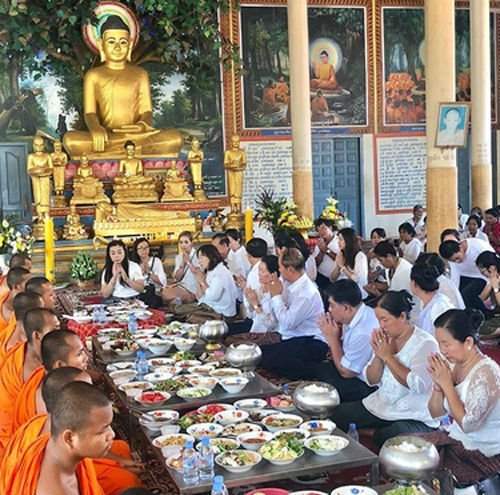
Every family offers food (cooked rice) to Buddhist monks as they believe that the merit so incurred benefits their deceased ancestors living in the subtle world. These monks remain awake chanting all night and perform a cumbersome rite for these ancestors.
4D. Srilanka
Here as per Buddhist tradition the dead are offered food on the 7th day, 3rd month and on completion of a year after death. This is called ‘Matakdanay’. In comparison with the merits incurred by donation of food those souls are believed to get appropriate things in the respective regions of existence. The family believes that souls who could not reach these regions wander and torment living beings through different illnesses and calamities. Hence Buddhist monks are invited to perform a ritual for protection from such souls.
4E. Myanmar (Brahmadesh)
Here the festival is celebrated as a melancholic event, exactly the opposite of what is done in Japan. From morning till night people cry and wail in their homes. Only those who have lost at least one relative in the past 3 years are allowed to participate in this condolence meeting. In Myanmar this festival is celebrated either at the end of August or at the beginning of September and includes offering of food and clothes.
4F. Philippines
In this country before being made a colony by Spain the religion of Onitisam which believed that a subtle world equivalent to the earth with souls (which they called onito), existed.
Onitos are souls of our ancestors and influence the life of living beings. The Pegonoito function celebrated there is a kind of spiiritual event in which the traditional shaman (an individual capable of communicating with souls of the deceased) communicates with souls. This is celebrated on 19th February.
After the Spanish invasion citizens who converted to Christianity began visiting the graves of their dead relatives in the cemetery, cleaning them, offering flowers and lighting candles. Children are asked to collect the wax melting from burning candles and to make a ball out of it giving the message that rebirth occurs after death.
The importance of deceased ancestors is emphasised through examples of different religions and cultures in American, European and Asian countries. Everywhere this period falls between August and November. Even in Bharat Pitrupaksha (fortnight of deceased ancestors) falls in the Hindu lunar month of Ashwin (around August or September).
Despite similar rites being performed in other religions, ridiculing Hindus for their shraddha rites for deceased ancestors indicates the hatred for Hindus quite clearly.
5. The Communist leader Sazhi Umalatova
came to Bharat to perform the rituals of tarpan and
pindadan to appease the soul of the late Russian President Boris Yeltsin
5A.Yeltsin appeared in the dream of his staunch
opponent Umalatova to make her aware that he was unhappy
Russian communist leader Umalatova visited Bharat in March 2010 to perform the rites of tarpan and pindadan for former President Boris Yeltsin to appease his soul. A former member of the Russian Parliament Umalatova she is the founder President of the Party of Peace and Unity. Though a communist she was a strong opponent of Gorbachev and Yeltsin and vehemently opposed the disintegration of the Soviet Union after which their differences widened further. Umalatova stated that Yeltsin would appear in her dreams frequently and argue with her on political issues. Sometimes he appeared sad out of guilt. So his soul was unhappy and restless.
5B. Umalatova expressed the desire to perform
a yadnya and tarpan to appease the soul of Yeltsin
Umalatova discussed her dreams with Chairman of the Dev Sanskrut Vishwavidyalay Dr. Dnyaneshwar Mishra from Haridwar and expressed the desire to perform yadnya and tarpan for the repose of his soul.
5C.Umalatova perceiving tremendous comfort after performing
shraddha and tarpan and her receiving initiation into the Vedic Dharma
As per her wish this ritual was performed under the guidance of Pandit Uday Mishra and Pandit Shivaprasad Mishra from Haridwar. She offered tarpan to Yeltsin. She also offered yadnya and pindadan to her parents and two of her brothers killed in Afghanistan and prayed for the repose of their souls. After the ritual Umalatova commented on how she was feeling calm after the rites, as if she had repaid debts unto someone. After this Bharatiya culture and philosophy had such a great impact on her that she got initiated into the Vedic Dharma.
6. In Bharat as per Scriptures new moon day (amavasya)
is a day which is most dear to souls of deceased ancestors
The Matsya Puran gives a tale to elaborate the importance of this date. It makes a mention of the Achchhod lake and river which presently exist in Kashmir.
अच्छोदा नाम तेषां तु मानसी कन्यका नदी ॥
अच्छोदं नाम च सरः पितृभिर्निर्मितं पुरा ।
अच्छोदा तु तपश्
चक्रे दिव्यं वर्षसहस्रकम् ॥
Matsyapuran, Chapter 14, Holy verses 2 and 3
Meaning : River Achchhod flows where the descendants of Bhagwan Marichi reside. She is the adopted daughter of the messengers of ancestors. In the ancient times ancestors had created a lake named Achchhod there. Before that Achchhod the adopted daughter of Agnishvatta had performed intense austerities here for a 1000 years.
Kashmir is an ancient state from Bharat. Marichi’s son Kashyap formerly named Kashyamppar or Kashemarr. The Matsya Puran states that at a place called Sompath the son of Marichi lived with the messengers of the deceased ancestors of the Deity Agnishvatta. With passage of time Achchhod the adopted daughter of Agnishvatta performed intense austerities for 1000 years. Pleased with her penance messengers of deceased ancestors, beautiful and radiant like deities came to bless her. Entinced by their beauty she got attracted to an ancestor named Amavasu. As this was a sin Amavasu rejected and cursed her. The day that Amavasu spurned her sexual passion due to his virtue of ‘remaining within his limits’ came to be know as Amavasya. Ever since it became the most favourite date, as per Hindu lunar calendar, for deceased ancestors.
7. Bharatiyas living abroad getting the rituals of shraddha
and tarpan done from priests through video conferencing is absolutely wrong
In the past few years Bharatiyas settled abroad are registering with priests in Ujjain and Gaya and are getting the rites of tarpan and pindadan done over video conferencing. Some priests have granted permission for this and get the resolve done from the host over the phone. The priest then performs it for the host. Though the Scriptures allow this in calamitous times doing it simply because they do not want to come to Bharat because of monetary loss, is wrong. For salvation of ancestors one should perform these rites oneself. This appeases them clearing the path for their release.
Famous Hollywood actor Sylvester Stallone gets these rites performed for his dead son by sending his entire family to Haridwar and Bharatiyas settled abroad have no time for it !
8. Importance of sacred grass which comprises an
important component in the rite of shraddha in the Hindu Dharma
According to a story from the Mahabharat when Deity Garud came to the earth with the pot of nectar for sometime he had placed it on grass. That is the reason why glass is considered sacred and pure.
At the time of shraddha there is a tradition of wearing a grass ring on the ring finger. It is said that Brahma exists in the tip, Vishnu in the middle portion and Shiva at the bottom of a blade of grass. Wearing this grass ring indicates that we have performed the rites of shraddha and pindadan for our ancestors by becoming pure.
9.The example set by Karna that offering pinda
and food for deceased ancestors is superior to donation of gold
As per an ancient story after Karna’s death when his soul reached heaven he was given ample gold and ornaments as food. He asked Deity Indra why he was given gold instead of food upon which He replied, ‘When you were alive throughout your life you donated gold, never offered food to your deceased ancestors.’ Karna then expressed ignorance about having to serve food to deceased ancestors. So he was granted an opportunity to rectify his mistake and was sent back to the earth for 16 days in the fortnight for ancestors. When he returned to the earth he offered food and water in memory of his ancestors.
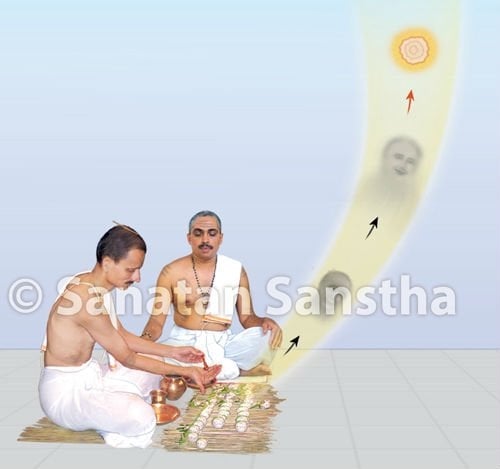
This famous story explains how offering pinda, food and water to deceased ancestors is better than donation of gold.
10. Anti-Hindus are ignorant ones raising doubts on
important rites such as shraddha without studying the Scriptures
Anti-Hindus make different accusations to target priests with respect to performing shraddha rites. This article will prove them wrong.
For example priests performing shraddha rites are expected to follow certain regulations as per the Scriptures. For example the priest has to be a knower of the Vedas, he should be pure, calm, righteous, performing austerities, having faith in the Scriptures, respecting them, with pure conduct and able to perform agnihotra. If such a capable priest is not available then a knowledgeable yogi should be summoned for the shraddha rites.If even such yogis are not available then a retired householder should be asked to performed it and should be offered a meal. If even such a retired householder is not available then one desirous of final Liberation, that is one with the attitude of a seeker should be offered a meal.
Ancestors for whom shraddha rites are performed by a priest who does not do regular worship, meditation, yadnya etc. gives those souls a status in the demon species. Priests who drink alcohol, enjoy with prostitutes, lie, disrespect parents or the Guru, are unrighteous, do not have faith in the Vedas or criticise them and are ungrateful should neither be invited to perform shraddha rites nor should he given offerings. Offering should be made only to the righteous that too with the consent of the family.
These norms described in the Scriptures will clear the doubts raised by opponents
As tenets of the Hindu Dharma are universal, irrespective of
the religion, individuals from other religions too benefit from them
The tenets of the Hindu Dharma are considered eternal and universal. Be it a Hindu or one from any other religion the one who follows the Scriptures certainly benefits from them. Just as a patient irrespective of his religion, caste and sect benefits from a medicine so also an individual belonging to any other religion also benefits by following the Hindu Scriptures.
At present 60 to 80% people from developing foreign countries are suffering from mental illnesses. In the US one out of five suffers from a mental illness. Why is a study not done then about why in a developing spiritual country like Bharat the comparative rate of mental illness is less ? Solutions to all problems do not lie in modern science and worldly development. That is precisely why foreigners come to Gaya (Bihar) to perform shraddha, pindadan and tarpan.
Famous Hollywood actor Sylvestor Stallone was constantly aware of the soul of his deceased son because of which he sent his entire family to Haridwar to perform pindadan and shraddha for the repose of his soul. After this ritual did at least one Hindu object by saying that pinda should not have been offered by him because he is a Christian ? This means that the shraddha rites from the Hindu Dharma are not linked to your religion of birth.

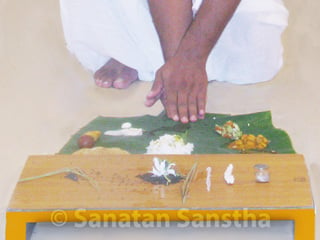 Method of serving food during Shraddha ritual
Method of serving food during Shraddha ritual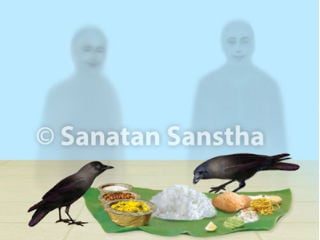 How to perform Mahalaya shraddha in Pitrupaksha during the Coronavirus pandemic ?
How to perform Mahalaya shraddha in Pitrupaksha during the Coronavirus pandemic ?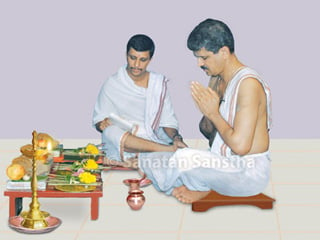 What are three historically established phases of Shraddha?
What are three historically established phases of Shraddha?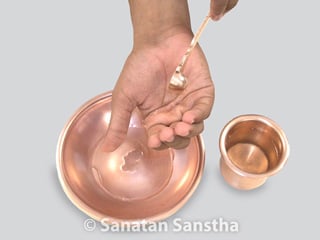 What is the method of performing Tarpan and Pitru tarpan ?
What is the method of performing Tarpan and Pitru tarpan ?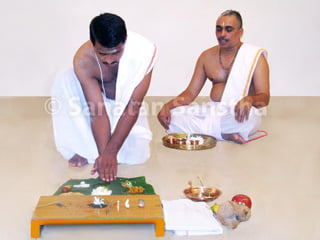 When should the Shraddha be performed ?
When should the Shraddha be performed ?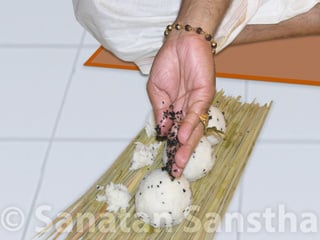 When can women perform Shraddha ?
When can women perform Shraddha ?